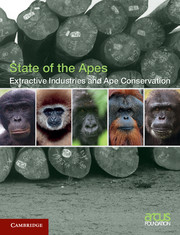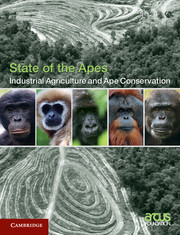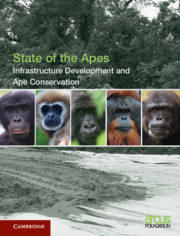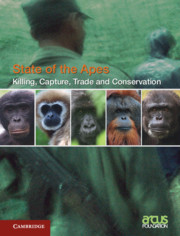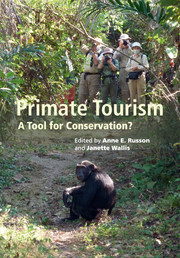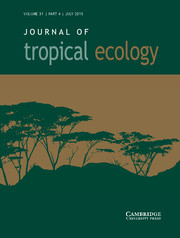Extractive Industries and Ape Conservation
£33.99
Part of State of the Apes
- Author: Arcus Foundation
- Date Published: March 2014
- availability: Available
- format: Paperback
- isbn: 9781107696211
£
33.99
Paperback
Other available formats:
Hardback, eBook
Looking for an inspection copy?
This title is not currently available on inspection
-
Current dominant thinking and practice in the private and public sectors asserts that peoples' development needs are in conflict with, or mutually exclusive to, the need to conserve the biosphere on which we depend. Consequently, we are asked to either diminish development in the name of conservation or diminish conservation in the name of development. Efforts to identify complementary objectives, or mutually acceptable trade-offs and compromises indicate, however, that this does not always have to be the case. This first volume in the State of the Apes series draws attention to the evolving context within which great ape and gibbon habitats are increasingly interfacing with extractive industries. Intended for a broad range of policy makers, industry experts, decision makers, academics, researchers and NGOs, these publications aim to influence debate, practice and policy, seeking to reconcile ape conservation and welfare, and economic and social development, through objective and rigorous analysis.
Read more- The first volume to be published in an important new series, using objective and rigorous analysis to present, for the first time, statistics and information on all non-human ape species
- Intended to enhance and influence debate, practice and policy for a broad range of policy makers, industry experts and decision makers, academics, researchers and NGOs
- Beautifully illustrated in full colour throughout
Reviews & endorsements
'… a very good overview … The authors are experts and the explanations and examples are up-to-date.' Gorilla Journal
See more reviews'This book is about the consequences that extractive industry is having on the tropical forests of Africa and Asia and the remaining apes that live within them. It is about the local, regional, and national policies that govern the extractive industry and the steps towards mitigation that stakeholders can consider. It has no fairy tale ending; it proposes no silver bullet. Rather, it is an attempt to lay out the consequences of today's resource extraction practices on ape communities and more importantly, encourage a shift towards acceptance that this industry and the environment are inexplicably connected … an important contribution towards identifying both the challenges and potential solutions involved in ape habitat conservation, written by a foundation that is a world leader in safeguarding wild and captive apes … Anyone interested in being familiar with how best to resolve this broader, widespread conflict must read this book.' Alex K. Piel, Primate Eye
Customer reviews
Not yet reviewed
Be the first to review
Review was not posted due to profanity
×Product details
- Date Published: March 2014
- format: Paperback
- isbn: 9781107696211
- length: 377 pages
- dimensions: 247 x 190 x 17 mm
- weight: 0.84kg
- contains: 2 b/w illus. 130 colour illus. 23 tables
- availability: Available
Table of Contents
Foreword
The Arcus Foundation
Notes to readers
Acknowledgments
Introduction
Part I:
1. From global to local: the megatrends at the interface of apes and industry and the case of trade, law, and finance
2. Land tenure: industry, ape conservation, and communities
3. Ecological impacts of extractive industries on ape populations
4. Avoiding the chainsaws: industrial timber extraction and apes
5. Mining/oil extraction and ape populations and habitats
6. Artisanal and small-scale mining and apes
7. The bigger picture: indirect impacts of extractive industries on apes and ape habitat
8. Case studies of national responses to the impacts of extractive industries on great apes
Part II:
9. The status of apes across Africa and Asia
10. Status of captive apes across Africa and Asia: the impact of extractive industry
Annexes
Acronyms and abbreviations
Glossary
References
Index.-
General Resources
Find resources associated with this title
Type Name Unlocked * Format Size Showing of
This title is supported by one or more locked resources. Access to locked resources is granted exclusively by Cambridge University Press to lecturers whose faculty status has been verified. To gain access to locked resources, lecturers should sign in to or register for a Cambridge user account.
Please use locked resources responsibly and exercise your professional discretion when choosing how you share these materials with your students. Other lecturers may wish to use locked resources for assessment purposes and their usefulness is undermined when the source files (for example, solution manuals or test banks) are shared online or via social networks.
Supplementary resources are subject to copyright. Lecturers are permitted to view, print or download these resources for use in their teaching, but may not change them or use them for commercial gain.
If you are having problems accessing these resources please contact [email protected].
Sorry, this resource is locked
Please register or sign in to request access. If you are having problems accessing these resources please email [email protected]
Register Sign in» Proceed
You are now leaving the Cambridge University Press website. Your eBook purchase and download will be completed by our partner www.ebooks.com. Please see the permission section of the www.ebooks.com catalogue page for details of the print & copy limits on our eBooks.
Continue ×Are you sure you want to delete your account?
This cannot be undone.
Thank you for your feedback which will help us improve our service.
If you requested a response, we will make sure to get back to you shortly.
×
